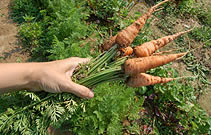Would you like to eat fresh food that’s good for you and the planet? Get into gardening in your own backyard.
Much of the food we eat has travelled hundreds, even thousands of kilometres to reach us. The carbon emissions from transport and refrigerated storage are a significant contributor to climate change.
Creating a food garden at home or in your local community is a simple and effective way to reduce your impact on the environment. It will also give you the experience of pleasure that comes from growing your own food – there’s nothing like raiding your veggie patch for the night’s dinner. You’ll also enjoy the taste of pesticide-free and truly fresh food.
Growing your own food is good for you and great for the planet – and it can save you cash!
 How to do it now!
How to do it now!
Select a sunny site in your own garden. Vegetables and fruit generally like six hours of sunshine a day, so you need to situate your produce area in a sunny spot. Some shade from the hot westerly sun is preferable. Remember that conditions change over the seasons (particularly the amount of shade cast by buildings and trees), so make sure you’re aware of the conditions that prevail throughout the year.
Consider a border for your garden. This isn’t always necessary, but it is required for a no-dig garden, where you have to build up the soil. Borders can be simply made with bricks, pavers, palings, sleepers, stones, branches or similar materials.
Add lots of organic material to your garden beds. Produce gardens are hungry gardens and require additional organic matter. Common materials include your home-grown compost or worm castings (See our Recycle organic waste action), chicken poo (that has been left to mature for several months), cow manure and mushroom compost. Add plenty of this material to the garden and leave it to settle for a few weeks before planting.
Set up your irrigation system. Watering your veggie patch or fruit trees is most efficiently done using drip systems that deliver water to the garden as single drops. Ideally this system would be fed from your water tank (See our Harvest and use your rainwater action), although using mains water to produce food is hardly a waste of water. Drip systems (and ‘shrubblers’) reduce evaporation because the water doesn’t just mist into the air. Once the water enters the soil it soaks in both horizontally and vertically.
Select your seeds and companion plants. You can buy seeds at all local nurseries, but for the best quality go for organic and heirloom varieties. They ensure that the planet is looked after too. Some of the best seed suppliers are:
- The Diggers Club
- Green Harvest Organic Gardening Supplies
- EdenSeeds
- Greenpatch Organic Seeds
- Ceres Nursery – Seed Savers
All of these suppliers also have calendars to tell you when to sow your vegetables and fruits, as the seasons are different in each different climate area.


